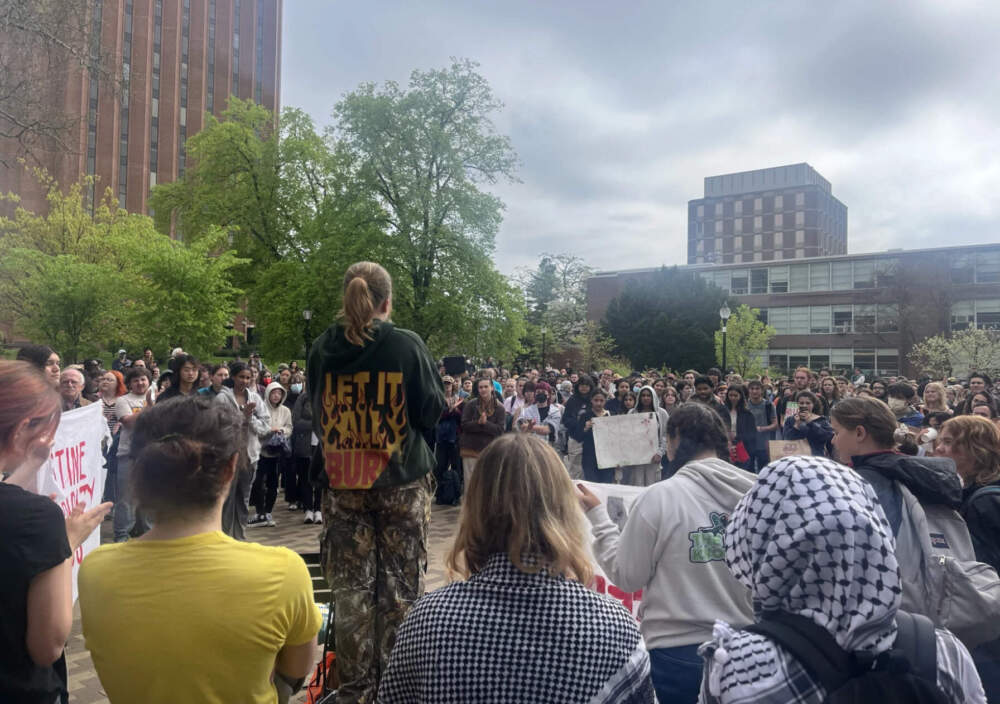A report released by the University of Massachusetts, Amherst Thursday looked at how and why the school responded with a heavy police presence during campus demonstrations against the war in Gaza last year.
The inquiry was conducted by attorneys at Prince Lobel, a Boston-based law firm hired by the University of Massachusetts.
According to the report, UMass Amherst Chancellor Javier Reyes’s concerns were connected to safety and precedence.
Investigators found Reyes’s decision to disband the protest using police “reasonable,” but the attorneys also questioned if the chancellor could have taken another approach.
The bulk of the report tells the story of two protests, April 29 and May 7, 2024. It refers to encampments students set up on the South Lawn of the campus, and the events leading up to the encampments from the perspectives of the primary constituencies involved.
The report states, “These detailed (and often, very personal) accounts cannot be fairly summarized in a few paragraphs, and we do not attempt to do so here. Rather, in this executive summary, we provide an overview of our findings and conclusions, which are narrowly tailored to answer the main questions of our charge: 1) what was the basis of the administration’s decision to direct law enforcement to remove the May 7 encampment; and 2) was that decision reasonable and prudent?”
The May 7, 2024 protest ended with the arrest of 134 people.
At the time, school administrators said the issue was not that students were protesting; it was the structures the set up on the protest site, like fencing, even after they were told by school officials to remove them.
“[The school’s] assessment of the risks, especially of violence, was understandable based on the information it had about the encampments on its own campus and the chaos that was engulfing some other college campuses where encampments had been established,” the report said.
Based on interviews with students and school leaders, the attorneys who wrote the report query if the protest have ended on its own.
“Even if (as we have found) the chancellor’s decision was reasonable, there is still a question of whether another road should have been taken,” the report said.
Administrators at the school pursued several methods of “de-escalation,” the report said, “all with the aim of having the encampment organizers immediately undertake the disassembly of the encampment.”
School officials might have adopted a “wait and see” approach the report said. It would have given the chancellor and others the opportunity to assess whether events were moving in a positive or negative direction.
The attorneys said they were struck by the analysis of one of the protest leaders, who felt the chancellor had an easier way out by simply letting the May 7 encampment remain.
“When we asked her if the encampment had a “natural end point,” she quickly replied, ‘Oh my God, yes, finals were next week,’” the report said.
In her estimation the encampment may have just “petered out.” This assessment was shared by a UMass Police Department official.
Timing also contributed to a large and visible police force.
At one point on May 7, Chancellor Reyes agreed to engage in a direct, face-to-face meeting with student protesters. It was not factored in to the school’s strategic plan for police to remove the encampment if other methods failed, and the meeting delayed a final warning to protestors.
“As a result of the delay, a very large and visible police force was positioned behind [a building] for an extended period, which became known to the protesters, who themselves called for reinforcements,” the report said.
By the time the police did intervene a little after 7p.m., “there were many more protesters and other people present, and the situation was highly fraught and complex. As the crowd grew, the [Massachusetts State Police] commanders on site called for more State Troopers. The State Troopers became the leading edge of the police enforcement of the Administration’s decision.”
All of this — the delay, the assemblage of more protesters and police and a lack of communication between the chancellor and law enforcement — “likely resulted in many more arrests than would have occurred otherwise,” the report concludes.
Those interviewed by the attorneys said they recognized that damage has been done; the trust between many students and the institution has been eroded.
This story is developing and will be updated. It is a production of the New England News Collaborative and was originally published by New England Public Media.
Disclosure: The license for NEPM’s main radio signal is held by UMass Amherst. The newsroom operates independently.

